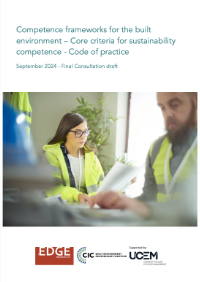Competence framework for sustainability in the built environment
The Edge is pleased to announce the publication of the Consultation Draft of ‘Competence frameworks for the built environment – Core criteria for sustainability competence – Code of practice’
Working with Workstream 10 of the CIC’s Climate Change Committee, the support of the University College for Estate Management (UCEM) and an industry-wide Advisory Panel, the Edge has developed a draft Competence Framework for sustainability in the built environment. The Framework is a Seed Document for an eventual British Standard intended to form part of its BS 8670 Competence series and is being published for public consultation and comment.
The Standard covers all aspects of sustainability for built environment and infrastructure provision, including associated external and landscape works, for the full breadth of professions and trades in the sector. It is an overarching framework for the development of discipline-specific competency frameworks.

|
The Draft Competence Framework can be downloaded from the Edge website at https://edgedebate.com/competence-framework-for-sustainability |
Comments on the Framework should be sent to the Edge at Before the close of the consultation period on November 16th 2024 |
This article was issued via the Edge Press Release as "Press Statement – the Edge Competence Framework for Sustainability" dated 12 September, 2024.
--edge
[edit] Related articles on Designing Buildings
- A Higher Bar. Achieving a competence led built environment.
- Best practice.
- Competence framework.
- Competence framework for project managers in the built environment launched.
- Competence management.
- Collaboration for Change, The Edge Commission Report on the Future of Professionalism
- Competence.
- Edge Debate 71 - Can decentralisation solve the housing crisis?
- Environmental frameworks, assessments and certifications in their historical context.
- Grenfell Tower.
- Hackitt review of the building regulations and fire safety, final report.
- Learning.
- Professional.
- Professional conduct.
- Professional practice.
- Recruiting and retaining talent in the construction industry.
- Robin Nicholson, convenor of the Edge and fellow of Cullinan studio.
- Skills gap.
- Submission of evidence to the Edge commission of inquiry on future professionalism.
- Sustainable development.
- Sustainable materials.
- Sustainable procurement.
- Sustainability appraisal.
- Sustainability in building design and construction
- Sustainability in facility management.
- The Edge Debate 74: Building better places - who cares?
- The Edge policy proposals for the built and natural environment 2022.
- The Edge Debate.
- The Edge Biannual Report 2023.
- The sustainability of construction works
About the wiki
Anyone is welcome to use and contribute to the wiki in different ways.
[edit] Engaging with the wiki
You can:
- Contribute to existing articles
- Create articles
- Share articles through social media and other channels
- Contact the CIRCuIT project to let us know what you think and how we can improve
[edit] Add your own content
To contribute to or create an article, you can follow these steps:
- Register as a user
- Read through the editorial policy and guidance on writing and contributing to articles
- See the detailed help page on tips on writing wiki articles
- Try editing a test article
- If editing an article, select 'Edit this article' underneath the article title
- If creating a new article, select 'Create an article'. In the 'Select categories' area, expand the 'Industry context' list and tag 'Circular economy' to add your article to this wiki
[edit] Who is this wiki for?
The articles contain information on implementing circular economy approaches in construction that could be relevant to:
- Architects
- Construction contractors
- Designers
- Developers, owners, investors
- Engineers
- Landowners
- Manufacturers and supplier
- Universities and research
- Urban planners
[edit] About CIRCuIT
The Circular Economy wiki is supported by the Circular Construction in Regenerative Cities (CIRCuIT) project, which is funded by the European Union's Horizon 2020 research and innovation programme. CIRCuIT is a collaborative project involving 31 ambitious partners across the entire built environment chain in Copenhagen, Hamburg, Helsinki Region and Greater London. Through a series of demonstrations, case studies, events and dissemination activities, the project will showcase how circular construction practices can be scaled and replicated across Europe to enable sustainable building in cities and the transition to a circular economy on a wider scale.








